Резиме Abstract - Journal of Special Education and Rehabilitation
Резиме Abstract - Journal of Special Education and Rehabilitation
Резиме Abstract - Journal of Special Education and Rehabilitation
You also want an ePaper? Increase the reach of your titles
YUMPU automatically turns print PDFs into web optimized ePapers that Google loves.
VIEWS-OPINIONS-DILEMMAS<br />
на ААМД (II дел) и Скалата за процена на<br />
однесувањето на детето в училиште на авторите<br />
Бојанин, Савановиќ.<br />
Клучни зборови: проблеми во однесувањето,<br />
деца со лесна интелектуална попреченост,<br />
деца со умерена интелектуална<br />
попреченост.<br />
Вовед<br />
Дефектологот во работата со лица со попреченост,<br />
своите базични заклучоци ги заснова<br />
на проценувањето на однесувањето на рехабилитантот<br />
и адекватно применува соодветни<br />
социотераписки, психотераписки и рехабилитациски<br />
постапки (1). Однесувањето на<br />
детето со интелектуална попреченост мора<br />
да биде согледано во контекст на семејно-социјалните<br />
услови во кои живее и расте (2).<br />
Семејната и пошироката – општествена и<br />
културна средина, значајно влијаат во создавањето<br />
на прифатливи облици на однесување<br />
кај децата (3). Доколку средината е потолерантна<br />
и со поголемо разбирање кон овие<br />
лица, проблемите во однесувањето полека<br />
исчезнуваат и лицето се адаптира во конкретната<br />
средина, но и средината на него (4).<br />
Интелектуално попречените деца потребно е<br />
да бидат научени на социјални вештини кои<br />
ќе доведат до развој на позитивни социјални<br />
релации и персонална компетенција (5). Социјалната<br />
компетенција треба да се согледа<br />
во нејзината целовитост, како интегративен<br />
модел од мултидимензионалноста на интелигенцијата<br />
и адаптивното однесување (6).<br />
Американската асоцијација за ментална ретардација<br />
при дефинирањето на лицата со<br />
интелектуална попреченост сигнификантно<br />
се фокусира на адаптивното однесување (7).<br />
Несоцијалните облици на однесување влијаат<br />
на стекнувањето и перформансот на<br />
адаптивното однесување (5). Критериум за<br />
адаптивно однесување кај лицата со интелектуална<br />
попреченост е дека заедницата<br />
може да го толерира нивното однесување<br />
(8). Проблематичното однесување се дефинира<br />
во однос на општествените норми на<br />
една заедница, при што тоа значајно отстапува<br />
од истите и предизвикува општествена<br />
реакција на неодобрување (9).<br />
Adaptive behavior Scale (part II) <strong>and</strong> Scale for<br />
evaluating behavior <strong>of</strong> the child in school by<br />
authors Bojanin, Savanovikj.<br />
Key words: behavioral problems, children<br />
with mild intellectual disability, children with<br />
moderate intellectual disability.<br />
Introduction<br />
While working with children with disabilities,<br />
the special educator <strong>and</strong> rehabilitator bases his<br />
conclusions about the child on the observation<br />
<strong>of</strong> the child’s behavior <strong>and</strong> applies sociotherapeutic,<br />
psychotherapeutic <strong>and</strong> rehabilitation<br />
methods adequately (1). The child’s<br />
behavior must be seen in context <strong>of</strong> the family<br />
<strong>and</strong> social environment in which the child lives,<br />
grows <strong>and</strong> develops (2). The family <strong>and</strong> also the<br />
wider social <strong>and</strong> cultural environment have<br />
strong influence on the development <strong>of</strong><br />
acceptable forms <strong>of</strong> behavior at children (3). If<br />
the community is more tolerant <strong>and</strong> shows more<br />
underst<strong>and</strong>ing to these persons, then behavior<br />
disorders slowly disappear <strong>and</strong> the person<br />
adapts to the society, <strong>and</strong> vice versa, the society<br />
to the person (4). Children with intellectual<br />
disabilities need to be trained to social skills<br />
that will develop positive social relations <strong>and</strong><br />
personal competence (5). Social competence <strong>of</strong><br />
these persons should be seen in its wholeness,<br />
as an integrative model <strong>of</strong> multidimensional<br />
intelligence <strong>and</strong> adaptive behavior (6). The<br />
American Association <strong>of</strong> Mentally Retarded<br />
while determining persons with intellectual<br />
disability focuses significantly on the adaptive<br />
behavior (7). Antisocial forms <strong>of</strong> behavior<br />
influence the acknowledgement <strong>and</strong> performance<br />
<strong>of</strong> adaptive behavior (5). The criterion<br />
for adaptive behavior <strong>of</strong> persons with intellecttual<br />
disabilities is that the community is tolerant<br />
to their behavior (8). Problematic behavior is<br />
detining social norms <strong>of</strong> the community, <strong>and</strong><br />
the behavior must significantly differ from the<br />
current norms <strong>and</strong> provokes social reaction <strong>of</strong><br />
disapproval (9).<br />
50<br />
JOURNAL OF SPECIAL EDUCATION AND REHABILITATION 2009; 10(1-2): 49-62



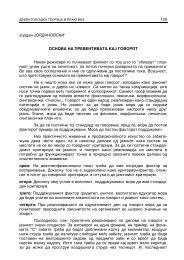
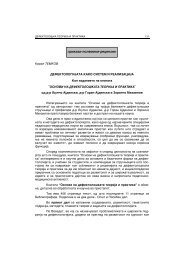
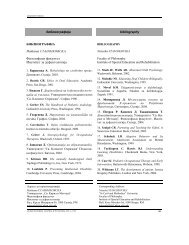
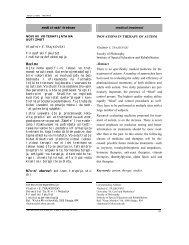
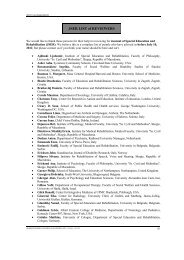
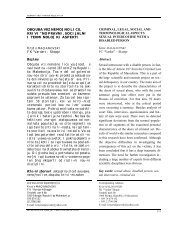
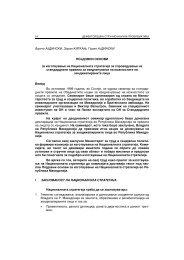
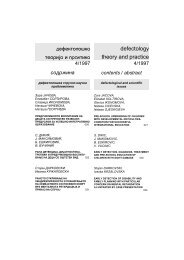
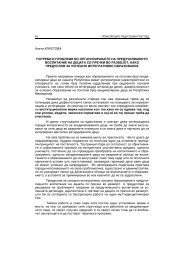
![b. apostoloski, m. ]aeva-pejkovska, s. nikolova, rana detekcija na ...](https://img.yumpu.com/32641898/1/184x260/b-apostoloski-m-aeva-pejkovska-s-nikolova-rana-detekcija-na-.jpg?quality=85)
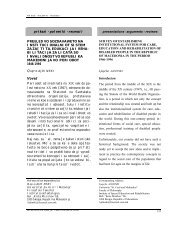
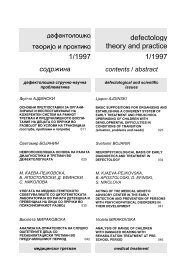
![45 Nada [IKI], Jelena IVI^EVI]-DESNICA AFAZIJA-EPILEPSIJA ...](https://img.yumpu.com/30952817/1/184x260/45-nada-iki-jelena-ivievi-desnica-afazija-epilepsija-.jpg?quality=85)
![120 Liljana KATI] Jagoda \OR\EVI] RAN TRETMAN NA EDEN ...](https://img.yumpu.com/29494618/1/184x260/120-liljana-kati-jagoda-orevi-ran-tretman-na-eden-.jpg?quality=85)